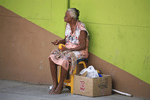Peru has progressed, but not enough
Published on Fri, 2012-11-23 14:19
Peru has made progress towards the Millennium Development Goals, but not enough to reach all the goals or to guarantee their sustainability. This is the conclusion of the Peruvian Social Watch coalition in its evaluation of public policies and international commitments for the Social Watch Report 2013. There has been considerable economic growth so far in the 21st century, but a lack of suitable follow-up and monitoring by the citizenry means that policies to combat poverty do not have the same dynamism and do not attack the roots of the problems, such as land ownership concentration in rural and urban areas and regressive taxation. The progress that has been made includes reductions in malnutrition and in infant and maternal mortality, but these gains should have been greater given that the country’s budget has tripled in the last ten years. “Millions of poor households depend on State benefits, and although some social indicators have clearly improved, it is doubtful that these results can be maintained.” According to an expert, Martha Milagros Varela Gómez, who is a member of the Peruvian Social Watch network and who wrote the national report, these short term economic gains have led to less conflict in the poorest sectors, and big business and landowners have become wealthier, but the Government has limited its social programme to assistance measures, it does not have an employment policy, and it lacks the will to tackle the most powerful economic groups. Varela Gómez says “International reserves are growing steadily”, there is “a lot of money in circulation”, and “the banks, retail trade, credit and plastic money” are expanding, which “is feeding the addiction to consumption” among the poor, “while at the same time crime, drug traffic and the white slave trade are on the rise”. Today Peru is “the biggest cocaine producer in the world” and “casinos, informal mining and smuggling are lucrative businesses that are opening the way for a new middle class to emerge.” This report points out there has been “sustained (economic) growth since 2000 with an annual average of 6%, and a steady statistical reduction in poverty” from 52% in 1990 to 27% in 2011. Moreover, there has been “a significant fall in chronic child malnutrition, which now stands at 19.5%, and a modest reduction in maternal mortality”. Millions of poor households depend on State benefits, and although certain indicators have clearly improved it is doubtful that these results can be maintained. Other negative aspects are that “Peru is the second worst country in the region (after Brazil) as regards the incidence of tuberculosis,” and there is “abysmal” “ongoing and worsening” economic and social inequality between “poor and non-poor regions; between the coast, the mountains and the jungle; between the cities and rural areas; and between rich and poor neighbourhoods in the cities. Wealth is becoming more concentrated. According to the report, ethnic, racial and gender discrimination still persist, and there is a gulf between private clinics for the rich and hospitals for the poor, and between private schools and universities and public schools and universities.” Social Watch adds that “The success stories are thanks to an expansion in public health services and social welfare schemes, but the same cannot be said of education, where the precariousness of State schools is still a festering problem… The public sector budget, which stood at 10,000 million dollars in 2000, now exceeds 30,000 million… and new middle classes and business groups are emerging in the country.” But the report states that “The big job, the effort to make this growth sustainable, has been abandoned… Environmental policies only exist in official documents, there are no employment policies and agriculture for producing food is ignored and is decaying. Politicians and governing groups have taken a pragmatic line and are incapable of tackling the privileges that the rich conservatives aggressively guard, and this is the biggest obstacle to genuine discussion about the basic situation as regards economic and social justice.” Varela Gómez emphasizes that the challenges the country must tackle are to pursue “the fair distribution of rural and urban land (some new estates set up to produce bio-fuels exceed 50,000 hectares); a redistribution of income, which is currently concentrated in the hands of big enterprises and their executives; a tax reform based on implementing universal direct taxes and reducing indirect ones; and sustained support for the more than three million micro-enterprises, and, in general, to reorganize the country in line with environmental sustainability standards.” Source
|


